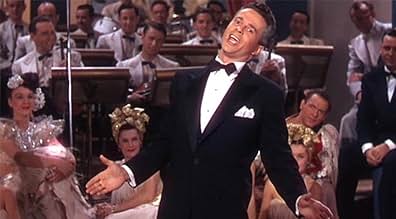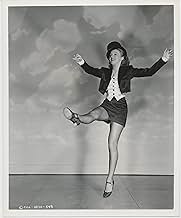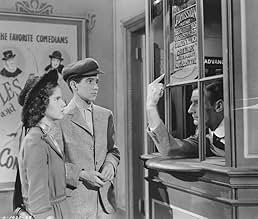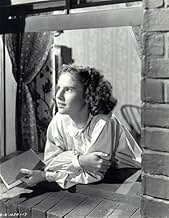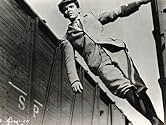Aggiungi una trama nella tua linguaThis movie shows the idealized career of the singer Al Jolson, a little Jewish boy who goes against the will of his father in order to be in showbiz. He becomes a star, falls in love with a ... Leggi tuttoThis movie shows the idealized career of the singer Al Jolson, a little Jewish boy who goes against the will of his father in order to be in showbiz. He becomes a star, falls in love with a non-Jewish dancer, and marries her. In the end he chooses success on the stage.This movie shows the idealized career of the singer Al Jolson, a little Jewish boy who goes against the will of his father in order to be in showbiz. He becomes a star, falls in love with a non-Jewish dancer, and marries her. In the end he chooses success on the stage.
- Regia
- Sceneggiatura
- Star
- Vincitore di 2 Oscar
- 5 vittorie e 5 candidature totali
- Church Choir
- (as Mitchell 'Boychoir')
- Audience Member
- (non citato nei titoli originali)
- Dancer
- (non citato nei titoli originali)
- Wardrobe Woman
- (non citato nei titoli originali)
- Audience Member
- (non citato nei titoli originali)
- Audience Member
- (non citato nei titoli originali)
- Audience Member
- (non citato nei titoli originali)
Recensioni in evidenza
This Technicolor production opens in Washington, DC, at the turn of the century where a young teenage boy named Asa Yoelson (Scotty Beckett) and his girlfriend, Ann Murray (Ann E. Todd) are seated in the audience at Kernan's Burlesque House watching Steve Martin (William Demarest) doing his comedy act. He asks for the audience to sing along as he plays his cello, but it is Asa who's the only one brave enough to stand up and start singing. Amazed by this young lad's natural talent, Martin locates Asa's home asking permission of his parents, Cantor and Mrs. Yoelson (Ludwig Donath and Tamara Shayne) to have him as part of his act. Papa Yoelson says no to the idea, and feels that the only place where his son should be singing is not in a theater, but in a Synagogue. Respecting the Cantor's wishes, Martin leaves for his tour. However, Asa leaves home, hopping on a freight car to find Martin, ending up in the residence of a Catholic Church run by a Father McGee (Ernest Cossart). Learning about the boy's background and purpose, the priest sends for both Steve and the Yoelsons, who arrive to find Asa singing in the choir. Not wanting Asa to be constantly running away from home, Mama Yoelson's convinces Papa to have their boy pursue his dream. Years pass. The act of Martin and Yoelson prove successful. Because Asa, now Al Jolson, wants to advance himself, it is Steve who breaks up the act by sending him over to perform in Lew Dockstader's (John Alexander) minstrels. With Steve's help once more, he arranges for Al to start his long and successful career at the Winter Garden on Broadway, with former "blackface" singer and friend, Tom Baron (Bill Goodwin) acting as manager. Jolson, who has never forgotten Steve, hires him as his agent. Now the biggest name in show business, Al Jolson's career takes a turn to success, starring in "the first talking picture," THE JAZZ SINGER, his courtship with Florenz Ziegfeld's (Eddie Kane) latest attraction, Julie Benson (Evelyn Keyes), star of the musical show, LIZA, their marriage, screen careers and finally retirement to the country. Problems arise as Julie learns she's competing with a full-time husband who would rather be a full-time entertainer.
The success of THE JOLSON STORY may not necessarily rely on the plot or its leading stars, but mainly the songs long associated with Al Jolson throughout his years in show business. The songs used for this production include: "Let Me Sing and I'm Happy," "On the Banks of the Wabash," "The Sabbath Prayer" (traditional Jewish prayer); Franz Schubert's "Ave Maria," "When You Were Sweet Sixteen," "After the Ball," "By the Light of the Silvery Moon," "Goodbye, My Blue Belle," "Ma Blushin' Rosie," "I Want a Girl, Just Like the Girl That Married Dear Old Dad," "Mammy," "I'm Sitting on Top of the World," "You Made Me Love You," "Swanee," "Toot-Toot Tootsie, Goodbye," "The Spaniard Who Blightened My Life," "April Showers," "California, Here I Come," "Liza," "There's a Rainbow 'Round My Shoulder," "Latin from Manhattan," "Avalon," "About a Quarter to Nine," "The Anniversary Song," "Waiting For the Robert E. Lee," "Rockabye Your Baby With a Dixie Melody," and "April Showers." Trivia: The "Swanee" number is actually performed by the real Al Jolson (in long shot), not Larry Parks.
As a musical, THE JOLSON STORY is grand entertainment. As a biography, it plays too much with the facts, adding inaccuracies to the screenplay. For example, a scene where preview audiences attend THE JAZZ SINGER (1927), hearing Jolson singing "There's a Rainbow Round My Shoulder," that was actually introduced in his second movie, THE SINGING FOOL (1928). Or one where Julie Benson (based on Ruby Keeler) in her movie debut, 42nd STREET (1933) performing a dance number, "Latin From Manhattan," that was really introduced in her latter musical, GO INTO YOUR DANCE (1935). One fact the writers got right is that Jolson and Benson (a/k/a Keeler) collaborated on screen in GO INTO YOUR DANCE, and the number, "About a Quarter to Nine," that accompanies the film, is true to life. Other titles involving Benson's career, SHIPMATES FOREVER, DAMES and GOLD DIGGERS, are used in the montage, but not presented in the order of their release. The costumes and hairstyles acquired by Evelyn Keyes and other actresses are strictly 1946 modern, not fitting into the period for which it is set. The same can be said for the orchestration, sounding more like the Big-Band-era than 1920s or 30s. Larry Park's lip sync recording of Jolson's voice is deeper and softer than the recording of decades ago. Parks, a Columbia contract player since 1941, earned him an Academy Award nomination. So successful was THE JOLSON STORY that Al Jolson, then a forgotten entertainer, was rediscovered again, winning the admiration and charm of a new and younger audience.THE JOLSON STORY, as it stands, fully deserves its place in motion picture history as one of the finest and most entertaining bio-pics ever produced.
Thanks to cable television's Turner Classic Movies, where THE JOLSON STORY premiered November 13, 2006, the Jolson legend can be seen and rediscovered again, along with the original Al Jolson musicals produced at Warner Brothers period (1927-1936), especially his best known and historical film, THE JAZZ SINGER. THE JOLSON STORY, available on video cassette and DVD formats, formerly presented on the Disney Channel in the mid 1990s, and occasionally on other commercial free cable channels, is pleasing both to the eye as well as to the ear. (****)
The film has an absorbing storyline even though it is not entirely accurate and it does take some liberties with the facts. Jolson's mother died when he was eight years old yet in the film she lives on to see him become a big success on Broadway. Many people who played active parts in Jolson's real life story did not even get a mention in the film version. His long time manager Louis Epstein, his dresser/valet Frank Holmes and his brother Harry were all eliminated from the plot! The character Steve Martin played by William Demarest did not actually exist and it has been suggested that this role was probably a composite of the three men referred to above plus several other people. Jolson's first two wives were not even mentioned and Ruby Keeler (Jolson's third wife) would not allow her name to be used in the picture so ravishing Evelyn Keyes had to play the fictitious Julie Benson instead. Ziegfeld: "This is Julie Benson - the star of my next production "Show Girl"." Jolson: "Mr Ziegfeld you will please not advertise on my time!".
Harry Cohn (the notorious head of Columbia Pictures) is to be congratulated for going ahead with this film when all the other major studios had turned it down. Even Warner Bros. (for whom Jolson had starred in several films) were not interested. Filming was started on a small budget and in black and white. However, when Harry Cohn saw the early rushes he decided to film in colour and make "The Jolson Story" a major prestigious production. This certainly paid off for him in a big way as the film became one of Columbia Pictures top money earners. Jolson desperately wanted to play the leading role himself and was opposed to another actor portraying his life. Unfortunately at that stage in his career he was obviously too old (he was 60) but the studio could not have found anyone better than the young Larry Parks (31) who perfectly captured the Jolson style and threw himself into the part with relish. However, Jolson did manage to play himself in one scene singing "Swanee" on the Winter Garden runway (all filmed in longshot with no close-ups). When I saw "The Jolson Story" for the first time it had a major impact on my life and for weeks afterwards I was quoting lines from the film that had stuck in my mind such as these from Jolson to Julie Benson: "Broadway, ha, what a street, you know something baby - it belongs to me. You know something else, if you want it, I'll give it to you!"
The musical numbers were absolutely magnificent and with popular songs like "California Here I Come", "You Made Me Love You", "Toot Toot Tootsie", "April Showers", "Robert E. Lee", "Liza", "Mammy", "Liza", "About a Quarter to Nine", "I'm Sitting on Top of the World" and "Rockabye Your Baby" how could it miss! If there is one film I could take to a desert island it would have to be "The Jolson Story" as I never tire of seeing repeated showings of this timeless classic. As Jolson himself would have said: "Settle back folks, you ain't heard nothin' yet!" (and he would be right about that). 10/10. Clive Roberts.
My father had me watch this movie as a kid on Million Dollar Movie and I was taken by the personality, drive, energy, and talent of this great entertainer. Hearing about, and seeing, silent movies made me all the more in awe of the talent Jolson must have been since Hollywood banked it's future on talkies with "The Jazz Singer".
Besides Parks excellent performances are also put in by William Demerest, who many of us remember as Uncle Charlie in My Three Sons, Evelyn Keyes as Julie Benson (Jolson's first wife) and the rest of the cast. The 1949 making of Jolson Sings Again is also worthwhile, if for no other reason than watching Parks do the masterful lip-sync and the incredible vocals of Jolson.
Lo sapevi?
- BlooperIl cantante di jazz (1927) had its world premiere at the Warner Theatre in New York, not the Winter Garden as depicted in the film (as "The Jolson Story" was a Columbia picture, the change is understandable).
- ConnessioniFeatured in The Soundman (1950)
- Colonne sonoreLet Me Sing and I'm Happy
(uncredited)
Written by Irving Berlin
Sung by Al Jolson over opening credits
Originally from Nomadi del canto (1930)
I più visti
- How long is The Jolson Story?Powered by Alexa
Dettagli
Botteghino
- Budget
- 2.800.000 USD (previsto)
- Tempo di esecuzione2 ore 8 minuti
- Proporzioni
- 1.37 : 1
Contribuisci a questa pagina


